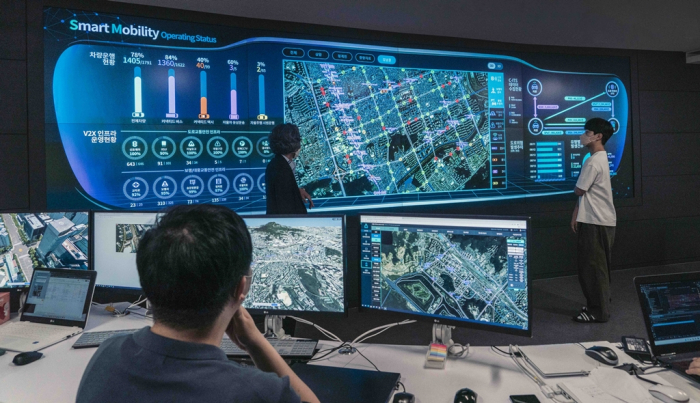Future mobility
SK Telecom expands system for self-driving in Seoul
The mobile carrier has made a 3D model of the pilot zone with digital twin technology to link it with Seoul’s control system
By Jun 28, 2022 (Gmt+09:00)
1
Min read
Most Read
LG Chem to sell water filter business to Glenwood PE for $692 million


KT&G eyes overseas M&A after rejecting activist fund's offer


Kyobo Life poised to buy Japan’s SBI Group-owned savings bank


StockX in merger talks with Naver’s online reseller Kream


Meritz backs half of ex-manager’s $210 mn hedge fund



SK Telecom Co., South Korea’s top mobile carrier, has expanded the area covered by the traffic control system for self-driving in Seoul, taking a step forward in its future mobility business.
SK Telecom said on Monday it extended the service zone for a cooperative intelligent transport system (C-ITS), the next-generation technology that connects vehicles and various parts of traffic infrastructures such as roads through 5G mobile communication.
The mobile carrier has established a pilot zone for autonomous driving based on information and communication technology (ICT) with the Seoul Metropolitan Government as part of the C-ITS demonstration project in Sangam-Dong, a digital media business precinct of the capital where celebrities gather.
The telecom unit of South Korea’s No. 2 conglomerate SK Group significantly widened the pilot zone from some commercial and residential areas to the nearby Seoul World Cup Stadium and parks. Self-driving cars in the zone can use SK Telecom’s information for safe driving through vehicle-to-everything (V2X) devices provided by the metropolitan government.
DIGITAL TWIN TECHNOLOGY
SK Telecom created a 3D model of the test area through digital twin technology to link the model with the self-driving control system of the city’s future mobility center to manage vehicles, traffic signal information and others. The local authority plans to use digital twin technology as an autonomous driving simulator.
Traffic infrastructures such as signal controllers have been significantly expanded in the pilot zone. SK Telecom is set to provide additional services to facilitate safe driving based on the infrastructure.
The mobile carrier has been working on the C-ITS demonstration project in Seoul, setting up 5G sensors and an internet of things (IoT) infrastructure on the city’s main roads.
It also installed the 5G advanced driver assistance system (ADAS) on taxis and buses while providing traffic signal information on major intersections through a navigation app from TMap Mobility Corp., an SK Group unit.
Write to Han-Gyeol Seon at always@hankyung.com
Jongwoo Cheon edited this article.
More to Read
-

-
 Korean chipmakersSamsung in talks to supply customized HBM4 to Nvidia, Broadcom, Google
Korean chipmakersSamsung in talks to supply customized HBM4 to Nvidia, Broadcom, Google21 HOURS AGO
-
 EnergyLS Cable breaks ground on $681 mn underwater cable plant in Chesapeake
EnergyLS Cable breaks ground on $681 mn underwater cable plant in ChesapeakeApr 29, 2025 (Gmt+09:00)
-
 Business & PoliticsUS tariffs add risk premium to dollar assets: Maurice Obstfeld
Business & PoliticsUS tariffs add risk premium to dollar assets: Maurice ObstfeldApr 29, 2025 (Gmt+09:00)
-

Comment 0
LOG IN


